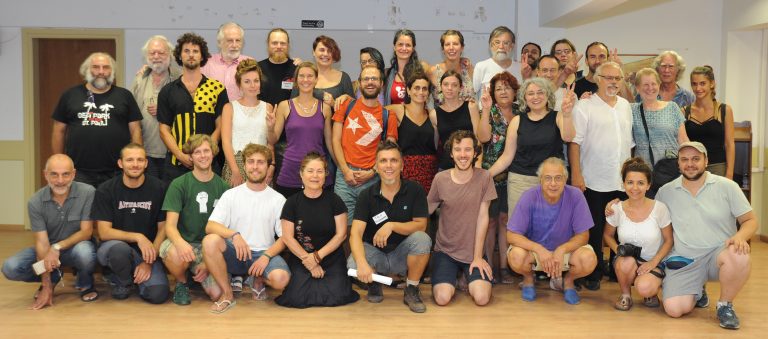Report from TRISE’s Conference “The Right to the City and Social Ecology”

From the 1st to the 3rd of September 2017 was organised the 4th TRISE conference: ‘The Right to the City and Social Ecology – Towards ecological and democratic cities’. It was held in Thessaloniki, Greece, and gathered a number of locals, activists and academics to discuss and exchange on the necessity to transform our urban environment towards one of ecological integrity and democratic public life. The conference included 6 keynote speeches, 5 interactive workshops as well as numerous paper presentations covering a wide diversity of topics from theoretical contributions to case studies of urban radical struggles in European cities.
The first day of the conference was devoted to the right to the city, a central concept of Henri Lefebvre’s thought that radically challenge the current paradigm of urban development, formulated in the words of David Harvey as ‘a right to change ourselves by changing the city’. Following opening words, Magali Fricaudet, a coordinator of the committee on Social Inclusion, Participatory Democracy and Human Rights within the UCLG, offered her reflections on the importance of focusing human rights within the local realm and the increasing role of the right to the city as an emancipatory perspective and strategy for a new municipalism. Her contribution was followed by a seminar on social ecology, the city and the state, where the presenters raised key questions about the conceptualisation of right to the city, the commons and direct democracy, and the cultural differences between state strategies and how to tackle them. In his speech on collective subjects and urban conflicts, Theodoros Karyotis, an independent researcher and social activist based in Thessaloniki, then reviewed the development of Greek urban resistance movements and expressed the necessity to consider issues of power and identity within social ecology theory and practice. The speech was followed by two workshops: One, presented by Jemma Neville, explored the process of constitutionalising in a neighborhood, and the other, held by Anne Scheinberg from the Springloop Cooperative, discussed the role of circular and informal economies in Europe.
The topic of the second day was social ecology and its relation to the Kurdish movement, in Rojava and beyond. The legacy of Murray Bookchin was offered by Brian Morris, anthropologist and political writer, who eloquently presented the main roots and concepts of Bookchin’s thought, from its philosophical underpinnings to the theory and practice of libertarian municiaplism. The following seminar explored case studies, one of environmental resistance movement in Bourgas, Bulgaria and the other on a suggested cycle path transformation in Patras, Greece. Havin Guneser, a Kurdish writer, journalist and women’s rights activist, then delivered a historical account of the Kurdish movement, the thought of Abdullah Öcalan and its relationships to Bookchin and the ideas of social ecology. This speech was followed by key contributions about the right to the city in Istanbul and the process of democratization in the cities of North Kurdistan. An interactive workshop closed the second day, where Federico Venturini and Malin Widehammar mediated focus groups reflecting on the relevance of social ecology for urban social movements. In the evening, following the double book launch of the Greek editions of ‘The Murray Bookchin Reader’ by Janet Biehl and ‘Political Ecology’ by Dimitrios Roussopoulos, it is in a convivial atmosphere that the presenters and attendants shared their dinner at Mikropolis, a radical social centre situated in the heart of Thessaloniki.
The final day of the conference was kick-started by Emet Degirmeci, an independent researcher and co-founder of the Social Ecology Groups in Turkey in the 90s, whose speech explored the social ecology approach to degrowth and developed her vision of alternatives to capitalism, from bioregionalism to the commons, through her grass-root experiences. This contribution was complemented by a seminar where social transformations were explored, from the concept of societal phase shift in socio-ecological systems to the resistance and struggle of squatting movements in Spain and Brazil. The last afternoon was diverse, starting with two workshops, one by Alekos Pantazis on communicating about the commons, and the other, an experiment of body displacement, by Vilelmini Andrioti. After that Dan Chodorkoff, an anthropologist who co-founded the Institute for Social Ecology in Vermont, delivered the final keynote speech with an honest, but optimistic and energizing tone. He reminded the importance of education, imagination and utopia to put theory into praxis, in the face of the revolutionary changes that the multi-dimensional crisis requires.
A concluding panel closed the conference by providing final reflections on the strategies and tactics to move towards ecological and democratic cities. Malin Widehammar, Svante Malmström, Havin Guneser and Theodoros Karyotis offered their visions discussed crucial issues pertaining to the processes of democratization, community organizing, solidarity economies, alternative institutions and media. Panellists elaborated on the necessity of material autonomy, individual commitment and the elaboration of a credible storyline if the movement is to be sustainable, scalable and coordinated.
Thanks to all the presenters and attendants, this 4th TRISE conference was an event rich in exchange of ideas and opportunities to meet and reflect on the right to the city, social ecology and urban radical movements in European cities. All the content is available online through the TRISE You Tube channel (links below), while a print book with the papers and speeches is in the making. Please contact us if you have any comments and reflections; and we look forward meeting you and/or seeing you again at the next TRISE conference!
,


Leave a Reply